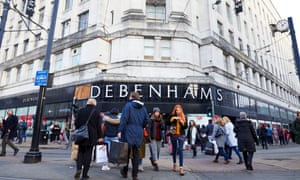Business chiefs call for dramatic overhaul of rates to help high street

Ministers are facing renewed pressure to reform business rates to bolster the UK’s high streets, with calls for a “complete review” from the Conservative mayor of the West Midlands.
Andy Street, who ran John Lewis before his election in 2017 as the mayor of the UK’s second-biggest urban economy, said the current system of business rates on commercial properties was no longer representative of modern Britain.
Speaking at a conference in London, he said: “[It] does not reflect the retail market and indeed how other companies make profit. There does need to be a much more complete review of how profit is achieved in the business sector.
“Business rates fall disproportionately on the high street. Ever since I was MD of John Lewis, we have been lobbying for some further changes to business rates than have currently occurred.”
It comes amid growing pressure on the government to overhaul how UK business properties are taxed, as more retail activity shifts online with the growth of internet firms such as Amazon, which typically require less physical space to sell goods and employ fewer workers.
Amazon recently confirmed it paid UK business rates of only £63.4m, almost £40m less than Next, despite the US company recording more than double the sales in the UK of the clothing and home retailer.
The chancellor, Philip Hammond, announced measures at the budget in autumn to cut business rates for small firms, while also introducing a “digital services tax” on internet retailers, saying they needed to “pay their fair share” in Britain.
Street said the help for small firms announced in the budget were “a good first start, but I wouldn’t describe it as any more than that”.
Traditional retailers have lurched further into crisis after a difficult Christmas trading period, reflected in growing numbers of retail companies filing for insolvency. Official figures on Tuesday showed a rise in company insolvencies to 4,725 in the last quarter.
Mike Cherry, the national chairman of the Federation of Small Businesses, said business rates were an “unfair” tax on small companies and contributed to more companies going bust.
“Amid the ongoing uncertainty as to what the UK’s relationship will look like with the EU after the 29 March 2019, SMEs are under the cosh more than ever and it’s time that action was taken to prevent more businesses going insolvent in the future,” he said.
Bill Grimsey, the former Wickes and Iceland chief executive who has conducted two reviews of the UK high street, said the system of business rates “should be abolished, [as] it does not work”.
Speaking alongside Andy Street at the conference, held by the Key Cities group of 24 mid-sized towns and cities, he urged a sales tax to replace business rates in order to reflect the shifting way consumers buy products.
“Amazon is in the room, and it is an elephant,” he said.
Grimsey also said he thought that Marks & Spencer clothes shops would disappear from the high street within five years, while supermarkets would need only half the space they have today by 2030. Other struggling retailers, such as Debenhams, would also cease to exist, he said.
“People aren’t going to shop in these places for household conveniences and things that they do not need to touch to buy,” he added.
A spokesperson for the Treasury said: “We concluded a fundamental review of business rates in 2016. Since then we’ve announced major reforms to the rates system, saving businesses over £13bn over the next five years.”

